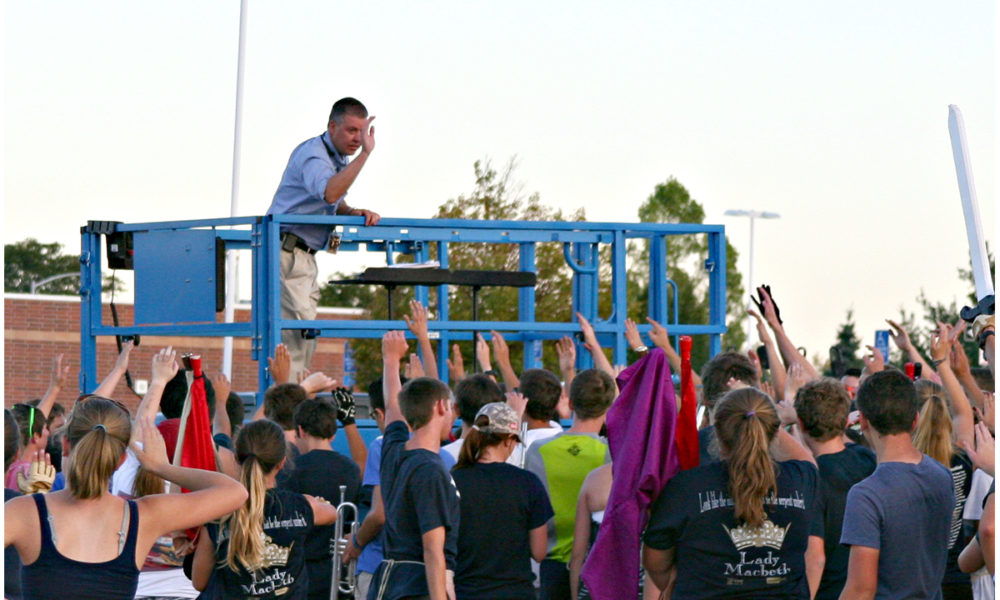Aligned with their band directors on common goals and values, booster organizations can better promote their organizations’ cultures and support their long-term goals.
At Foothill High School in Henderson, Nevada, director of bands Travis Pardee aims to take his group to Bands of America (BOA) Grand Nationals within the next two to three years. His ensemble is not new to the limelight as a nine-time BOA regional finalist and as a participant in prestigious parades in Ireland, Washington, D.C., and New York.
The band’s volunteer parent organization—the Falcon Band Boosters—takes strides to help the band director achieve this objective and others. “With that goal in mind, part of our role is educating parents about what it takes to operate a competitive band,” says Sean Thueson, president of the Falcon Band Boosters.
And while parents typically must shoulder a good portion of the financial responsibility for supporting a competitive marching band, the Foothill Band’s booster organization strives to minimize costs to parents wherever possible by reaching out to the community. “We do everything we can to get the community involved in supporting us,” Thueson explains. “We hope to get people—and the community—to understand the return on investment that comes from our students participating in the arts.”
Culture of Respect
In order to excel, Pardee and the Falcon Band Boosters strive to encourage a band culture of respect and positivity. “The expectation is that all students be respectful in all aspects of life, not just band,” Thueson explains. “That extends to the classroom, the home and the community. We ask parents to instill the same culture at home.”
Controlling social media messages helps everyone in the band stay on the same page. “Because social media is so huge in today’s society, our director wants our students to realize and remember that once they put something out there on the Internet, everyone can see it now and in the future,” Thueson says. “Being negative in any type of social media is highly frowned upon and discouraged and can result in disciplinary action.”
In fact, Pardee emphasizes this message to students and parents every year. “You are what you tweet,” he often says.
The Band Family
At Legacy High School in Broomfield, Colorado, the band boosters help director J. Clayton Stansberry promote a culture of family. “When you join the Legacy band program, you become part of the Legacy band family as well as our extended band family—band programs throughout the state,” explains booster president James Specht. “Every student and every family is important.”
With 225 students in the Legacy band program, the Legacy Band Boosters organization supports the director’s vision by keeping parents involved. “We do this in a number of ways, including a designated Freshman Liaison that helps new parents navigate the first year,” Specht says.
Other methods to engage new parents include informal meet-and-greets with new parents at summer band practices, all-parent meetings at the beginning of the school year, and social media outlets that are updated regularly. “We use social media to share upcoming events as well as photos from practices and shows,” Specht adds.
Jill Mahoney, director of bands at Peoria (Arizona) High School, also places an emphasis on family with band students and their parents. “Our culture is very much about family, about being a group, about having school spirit,” says David McAnally, president of the Peoria High School Panther Band Boosters. “As boosters, we work with the director toward the same goal: making band an overall enjoyable experience for the kids.”
For McAnally and the other veteran boosters, that means involving new parents. “We let new parents know that this is an opportunity to be a part of your child’s success, to see them at their best,” he says. “This is a great time to be involved with your child—the experience is going to be fun and fulfilling.”
Constant Contact
In order to support their band directors, boosters work closely with them in meetings. “Our director comes to our booster meetings, which are held on her turf—the band room,” McAnally says. “We do our best to give her and the rest of the staff the opportunity to be personal and honest with us, to find out what she needs.”
The Legacy band director attends all booster board meetings, and he is a critical advisor to the organization. “He makes recommendations and provides guidance,” Specht explains. “It is a true partnership where the ultimate goal is to provide the best experience we can for the kids.”
Having a close relationship between director and boosters leads to mutual achievements for all involved. “The boosters are on board with the director’s vision for the program,” Specht says. “It is the synergy between boosters, director, administration and students that makes the program a success.”


